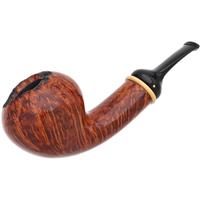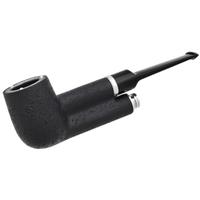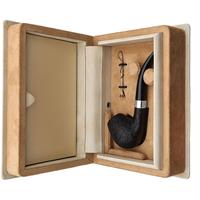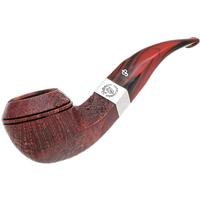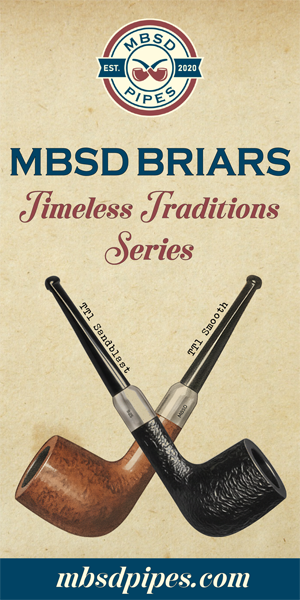Not far removed from a furniture factory I worked at when I was a kid. Still appears more cookie cutter than traditional artisan.My guess is that it will be a revelation for many people.
Advantages of Factory Pipes
- Thread starter mso489
- Start date
You are using an out of date browser. It may not display this or other websites correctly.
You should upgrade or use an alternative browser.
You should upgrade or use an alternative browser.
That How it's made show is great! I watch a lot of it on the weekends.Not far removed from a furniture factory I worked at when I was a kid. Still appears more cookie cutter than traditional artisan.
That's a good video. I agree, that some parts of the process may be a little more cookie cutter than the traditional artisan who might use more hand files, etc. for very fine finishing work, but I think a lot of artisans use very similar tools in their process. Just a smaller scale.Not far removed from a furniture factory I worked at when I was a kid. Still appears more cookie cutter than traditional artisan.
It's all still very much 'hands on' in the Dunhill factory and not at all like blocks of briar going into machines that spit out pipes at the end for people to collect in a push button sort of way.
The only advantage of a factory pipe is that they are usually cheaper and you care less what happens to it compared to an artisan pipe. This doesn’t mean factory pipes are bad though.
It's even more misleading if you look at what it meant over the various decades, and what it means now. But it's the same with most products that we look back on nostalgically, that were higher quality because of cheaper labor;e.g-Brunswick pool cues, Stetson hats.But, I suspect the pipe "factory" is wildly different and very much a misleading term, especially in our time.
From an article about Savinelli linked below:Artisan pipes are generally believed to be superior to factory pipes. One artist/craftsperson does the whole pipe with undivided attention and usually a comprehensive understanding of the whole process, from selecting the materials, to drilling, to applying the finish to exacting standards. In many cases the price reflects this extra quality.
However, most pipe factory craftspeople are long-experienced and trained under watchful eyes. There is an advantage to turning out hundreds or thousands of pipe on the same design, and repeating the same drilling, carving, and finishes, over and over, in a highly uniform way. There are usually few surprises, and the uniformity in design makes flaws stand out, for quality control.
So not everything about factory pipes is inferior. There can be advantages, and certainly, except with a few brands, the prices are much more moderate with factory products.
"As Giancarlo leads the way through the factory, he points out that there is a misunderstanding in many people’s minds about factory-made pipes. Although Savinelli may use some machines to remove unwanted wood at the earliest stages, so do most artisans working out of their homes. However, more than 80 percent of each pipe is produced by hand, he points out, involving many steps. For this reason each pipe is subtly different from every other pipe, he says, and not the result of assembly line production, which most people think of when they hear the word “factory.” “This makes our people and their skills our greatest resource.”
I find this topic interesting. And relatedly, I’ve been a musician my whole life and worked some in the music biz on the independent-ish side of things. (Independent vs industry — those lines have been quite blurred in the last 10-20 years, but I digress.) I’ve often seen this discussion come up in regards to custom guitars vs handmade non-customs vs factory pressed ones.
There is something incredibly special about picking your wood, knowing the craftsman, collaborating on the design, picking your hardware, electricals, etc. for a custom piece. I have never personally had a guitar built. I have come close, but never followed through. However, my guitarist has had multiple wonderful pieces built by a man in WV names Bill Crook. You may have heard his name. He builds guitars for Brad Paisley. He does absolutely stellar work. And yes, you pay for it.
And there’s also something special about playing a guitar you know was handmade. Over the years I’ve had several of these, and I still have 2. I currently have a 2010 Custom Shop Breedlove that was handmade, a Martin HD 35, and my 2001 Limited Edition Taylor 714. I love these guitars for a variety of reasons that are too many to list here.
It was a few years after the early 2000s that Taylor began manufacturing “factory” guitars as their popularity exploded. Rightly so, bc they make excellent instruments. I’ve never owned one of their factory pieces, but I’ve played plenty of them. The consistency is unmatched. And there’s certainly something to be said for that!
There is something incredibly special about picking your wood, knowing the craftsman, collaborating on the design, picking your hardware, electricals, etc. for a custom piece. I have never personally had a guitar built. I have come close, but never followed through. However, my guitarist has had multiple wonderful pieces built by a man in WV names Bill Crook. You may have heard his name. He builds guitars for Brad Paisley. He does absolutely stellar work. And yes, you pay for it.
And there’s also something special about playing a guitar you know was handmade. Over the years I’ve had several of these, and I still have 2. I currently have a 2010 Custom Shop Breedlove that was handmade, a Martin HD 35, and my 2001 Limited Edition Taylor 714. I love these guitars for a variety of reasons that are too many to list here.
It was a few years after the early 2000s that Taylor began manufacturing “factory” guitars as their popularity exploded. Rightly so, bc they make excellent instruments. I’ve never owned one of their factory pieces, but I’ve played plenty of them. The consistency is unmatched. And there’s certainly something to be said for that!
That's a good video. I agree, that some parts of the process may be a little more cookie cutter than the traditional artisan who might use more hand files, etc. for very fine finishing work, but I think a lot of artisans use very similar tools in their process. Just a smaller scale.
It's all still very much 'hands on' in the Dunhill factory and not at all like blocks of briar going into machines that spit out pipes at the end for people to collect in a push button sort of way.
There are clearly people who spend a heckuva lot of money on pipes, who have only a vague idea of how they are made. We tend to encourage anyone who makes pipes by telling them how great their pipes are, often failing to offer needed criticism, and that's all great; however, there are crappy artisan pipe-makers out there, and some may never reach the quality of a good factory pipe.
Very little of that process seemed 'hand crafted' to me in the old sense of hand crafting. My Dad was a licensed tool maker before WWII. At the beginning of his course they gave him a two inch square block of metal and a file. He had to hand file a perfect one inch ball bearing by the end of the semester. Those who didn't do it didn't proceed in the course. That's hand crafted under the old definition.Not far removed from a furniture factory I worked at when I was a kid. Still appears more cookie cutter than traditional artisan.
My point exactly.Very little of that process seemed 'hand crafted
Artisan pipes are generally believed to be superior to factory pipes. One artist/craftsperson does the whole pipe with undivided attention and usually a comprehensive understanding of the whole process, from selecting the materials, to drilling, to applying the finish to exacting standards. In many cases the price reflects this extra quality.
However, most pipe factory craftspeople are long-experienced and trained under watchful eyes. There is an advantage to turning out hundreds or thousands of pipe on the same design, and repeating the same drilling, carving, and finishes, over and over, in a highly uniform way. There are usually few surprises, and the uniformity in design makes flaws stand out, for quality control.
So not everything about factory pipes is inferior. There can be advantages, and certainly, except with a few brands, the prices are much more moderate with factory products.
Your post is a good one, but the ideas have been lost due to the Dunhill video, as the anti-factory guys now have something to latch onto and run with.
There are things that some factories are capable of doing, that an artisan will never do, and obviously there is a great deal of to-order stuff that an artisan can do, and a factory will not do. I have several gold band Supreme Petersons with nice stem inlays, that are among my favorite pipes. I can't imagine what an artisan would charge for such work, if they were able and willing to do it.
Getting back to Dunhills, I have quite a few shell briar Dunhills, and also several sandblasted artisan pipes. Perhaps it doesn't matter to anyone, but the Dunhills have flattened bottoms (both briar and stem), with clear legible stamps. The artisan pipes...no. Artisans go to great lengths to blast great rings or to use nice straight-grain briar, and that's fantastic. They make sure (most of the time) that their bent pipes pass a pipe-cleaner, as customers are fixated on that aspect of pipes. You will hear this talked up any time an anti-Peterson guy gets involved in a discussion. Are the artisan pipes a better value for the money? Perhaps you would be more impressed with a video showing an artisan making a pipe of similar design to a Dunhill. Would it actually be a better pipe? Would the cost be relatively the same?
Okay, back to the argument...I mean, the open-minded discussion.
It seems you might agree ... that if you find a great pipe, buy it, whether made by artisan or made by large company 'factory' ... that my open-minded take away from your comment... My guess is we generally agree.Your post is a good one, but the ideas have been lost due to the Dunhill video, as the anti-factory guys now have something to latch onto and run with.
There are things that some factories are capable of doing, that an artisan will never do, and obviously there is a great deal of to-order stuff that an artisan can do, and a factory will not do. I have several gold band Supreme Petersons with nice stem inlays, that are among my favorite pipes. I can't imagine what an artisan would charge for such work, if they were able and willing to do it.
Getting back to Dunhills, I have quite a few shell briar Dunhills, and also several sandblasted artisan pipes. Perhaps it doesn't matter to anyone, but the Dunhills have flattened bottoms (both briar and stem), with clear legible stamps. The artisan pipes...no. Artisans go to great lengths to blast great rings or to use nice straight-grain briar, and that's fantastic. They make sure (most of the time) that their bent pipes pass a pipe-cleaner, as customers are fixated on that aspect of pipes. You will hear this talked up any time an anti-Peterson guy gets involved in a discussion. Are the artisan pipes a better value for the money? Perhaps you would be more impressed with a video showing an artisan making a pipe of similar design to a Dunhill. Would it actually be a better pipe? Would the cost be relatively the same?
Okay, back to the argument...I mean, the open-minded discussion.
Spot-onIt seems you might agree ... that if you find a great pipe, buy it, whether made by artisan or made by large company 'factory' ... that my open-minded take away from your comment... My guess is we generally agree.
To illustrate my point, top pipe is a Peterson Supreme gold band - pre-1965 when the 120F stopped showing up in the catalogs.
Bottom pipe is a Giacomo Penzo morta.
Originally I was looking for examples of a factory pipe that an artisan wouldn't make, and an artisan pipe that a factory couldn't make. But...
...Penzo works for Peterson, but Peterson wouldn't (couldn't? - I mean, one of their workers clearly could) make a pipe like the bottom one. In some respects this might be a bad example, in that Penzo could make a pipe like the top one, and I've seen some beautiful banded pipes by him; however, most artisans wouldn't do it.
Still, it's a fun exercise and I'll come up with more examples later.

Bottom pipe is a Giacomo Penzo morta.
Originally I was looking for examples of a factory pipe that an artisan wouldn't make, and an artisan pipe that a factory couldn't make. But...
...Penzo works for Peterson, but Peterson wouldn't (couldn't? - I mean, one of their workers clearly could) make a pipe like the bottom one. In some respects this might be a bad example, in that Penzo could make a pipe like the top one, and I've seen some beautiful banded pipes by him; however, most artisans wouldn't do it.
Still, it's a fun exercise and I'll come up with more examples later.

I think of it like my Savinelli's. The Punto Oro Line, is all hand cut stems. That's great and and quality is amazing. But with that you never know what you are going to get. All 3 of mine have a slightly different button. When with my Rossi pipes, I know what to expect every time. Both have a place in my heart.
Some excellent arguments have been presented. It’s basically the same discussion as with cars, only the subject is a pipe. Would a Bentley or a Ferrari be a superior car than a Hyundai or Toyota? Technically, it shouldn’t matter. Stylistically, it’s in the eye of the beholder.
If the factory-process for pipes at, for example Peterson, would have been optimised to perfection, there shouldn’t be off-drilling. It isn’t, because we get pipes that aren‘t properly drilled or the stem doesn’t sit flush against the shank. It perhaps happens less often with artisan pipes, because those are truly handmade.
If the factory-process for pipes at, for example Peterson, would have been optimised to perfection, there shouldn’t be off-drilling. It isn’t, because we get pipes that aren‘t properly drilled or the stem doesn’t sit flush against the shank. It perhaps happens less often with artisan pipes, because those are truly handmade.
I used JB Weld on a vintage pipe that was over-reamed (thin walls and base).
Then I slathered a layer of pipe mud over the inside of the entire bowl.
Smokes great once it cured.
Not aware of any fumes, except that from the tobacco. ?
If someone in the future does ream it and smoke it that would be a super nasty surprise.
Please do remember to crush the bowl once you feel you're done with it.
The way I maintain my pipes, there should not be any need to ream the chamber. ?If someone in the future does ream it and smoke it that would be a super nasty surprise.
Please do remember to crush the bowl once you feel you're done with it.
I would pump the brakes a bit on the Peterson praise. Plenty of other factory makers are turning out more consistent production pipes. One more observation, people sometimes refer to Castello and Radice as being factory pipes. This frequently is stated in a somewhat dismissive manner. I would suggest that these, and some others, might be more appropriately described as "artisan workshop" pipes. Nothing wrong, by the way, with"factory" pipes. Most all of us have some or all and frequently smoke better than pipes by vaunted artisans whose pipes cost hundreds more.There was a time within living memory of very old men when the huge American pipe makers churned out millions of pipes a year, and each one made by hand on machines from a cured (and hopefully aged) chunk of briar.
Already by then. the standardization of shapes of pipes meant each large maker was making essentially the same product, stamping different brands on the shank.
Grabow did it more efficiently and advertised more effectively, and today is the last truly large producer of briar pipes in America.
Lee used three ways to differentiate his product. First, each pipe was graded and gold stars inletted into the stem. Second, Lee used a Kaywoodie style screw stem with a removable stinger. It must have been cheaper to make push stems, as this feature disappeared on the last Lees. The third thing Lee did was chose only the finest briar, oil cure it, and then have the most skillful craftsmen available make it. Lee pipes are all perfect smokers. On Three Star Grade and better there are no fills. I’ve never been able to improve one by drilling out the air passage. While the Pre War Kaywoodie Flame Grains are the highest expression of an American factory pipe, of American factory pipes made after the war Lee is by far the best, of a good lot of well made, excellent pipes.
Peterson today is the finest maker of affordable production pipes. But all my Petersons have a hard shell finish no early Kaywoodie or any Lee would have been allowed to have. It’s attractive and durable, but a fine pipe ideally has little or no stain and no varnish used to make it.
Most factory smokers are improved by drilling out the air passage.
Lee got it right the first time.
So allow me to summarize: we fail to agree on what "better" might be, and fail to agree on how important it is for any given pipe, and then argue that factory pipes are or are not that way in the first place?
Frankly, I'm shocked.
Frankly, I'm shocked.




